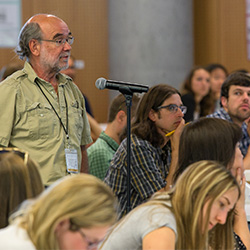Symposium Highlights Work of State’s Most Prominent Researchers
The University of Arizona College of Medicine – Phoenix and the Arizona Wellbeing Commons at Arizona State University hosted a symposium on June 7 at the Phoenix Biomedical Campus to present research pertaining to virology, immunology, microbiomes and infectious disease.
The symposium included three sessions, each followed by rapid-fire poster presentations. The first session covered immunology and the host response to infection; the second covered applied microbiome research to enhance health outcomes; and the third covered the tracking of immune responses and viruses. During each session, three to four researchers from UA, ASU or Northern Arizona University presented on their research projects.
The symposium invited professors, postdocs, graduate students and trainees from across the state.

Paul Boehmer, PhD, interim associate dean for research at the UA College of Medicine – Phoenix, was the other symposium co-host.
“The purpose of this event is to bring together Arizona scientists to share their work and stimulate collaboration and information sharing,” he said. “The bigger goal out of all of this, and from all of the research we conduct in basic medical sciences, is to have a greater impact on health.”
Researchers voiced that regional meetings like the one at the biomedical campus are more rare than one would think, but they are a strong source of collaboration within the community.
“Institutions are good at two kinds of meetings. One is a really local thing like a seminar series; and they are also really good at international meetings where people from all over the world come,” said Nels Elde, PhD, an associate professor and evolutionary geneticist at the University of Utah and keynote speaker at the symposium.
“The big hole here is a regional meeting like this where we take advantage of all the things happening in the neighborhood and then come together in ways that even though we are so close, it’s really rare that it happens. It’s a missing conversation in science. That’s why I think a meeting like this can be very powerful.”
Although regional meetings offer plenty of collaborative opportunities, it can be a challenge to generate interest. But with more than 140 registrants, Dr. McFadden noted that progress has been made in attracting researchers to events like the one last month.
“They are not easy to do; the natural barrier for scientists is that they are focused on their domain, getting money and doing their own research,” Dr. McFadden said. “Getting people to do this and follow the wider theme takes some work. But I would say so far, we can say we are making headway.”
Ultimately, the goal of the symposium was to foster potential collaborations among researchers. It also served to present new perspectives to up-and-coming scientists, particularly on the cultures of different research institutes.
“We all have our own cultures, and to start to mingle those together even locally, you start to compare things in different ways,” Dr. Elde said. “For trainees, postdocs and students, it can be very powerful to have those comparison points.”
Progress is born from collaboration, and even well-established researchers can benefit from such exposure.
“What’s really great here is the intermingling of really basic science (like how infectious microbes work) all the way through how we might modulate these interactions or design therapies or interventions,” Dr. Elde added. “To have people in the room doing both things — that might seem distinct, but as we bridge those interests — that’s a really powerful opportunity.”
This story originally appeared on ASU Now.
Story By: Gabrielle Hirneise
About the College
Founded in 2007, the University of Arizona College of Medicine – Phoenix inspires and trains exemplary physicians, scientists and leaders to advance its core missions in education, research, clinical care and service to communities across Arizona. The college’s strength lies in our collaborations and partnerships with clinical affiliates, community organizations and industry sponsors. With our primary affiliate, Banner Health, we are recognized as the premier academic medical center in Phoenix. As an anchor institution of the Phoenix Bioscience Core, the college is home to signature research programs in neurosciences, cardiopulmonary diseases, immunology, informatics and metabolism. These focus areas uniquely position us to drive biomedical research and bolster economic development in the region.
As an urban institution with strong roots in rural and tribal health, the college has graduated more than 1,000 physicians and matriculates 130 students each year. Greater than 60% of matriculating students are from Arizona and many continue training at our GME sponsored residency programs, ultimately pursuing local academic and community-based opportunities. While our traditional four-year program continues to thrive, we will launch our recently approved accelerated three-year medical student curriculum with exclusive focus on primary care. This program is designed to further enhance workforce retention needs across Arizona.
The college has embarked on our strategic plan for 2025 to 2030. Learn more.